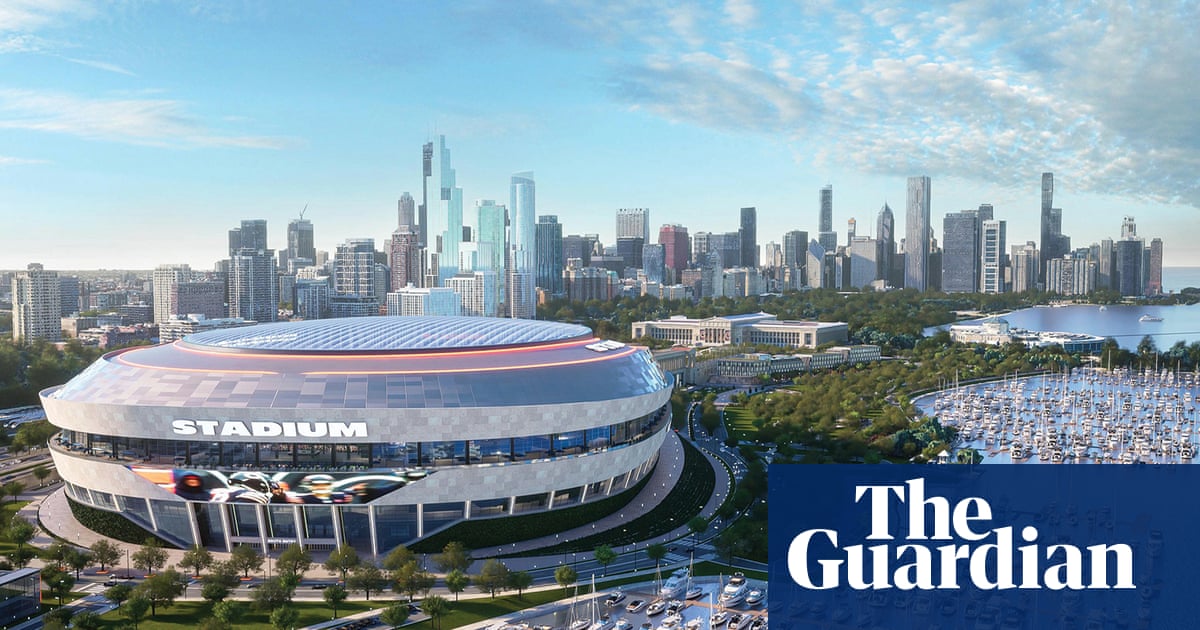The Chicago Bears unveiled a nearly $5bn proposal Wednesday for an enclosed stadium next door to their current home at Soldier Field as part of a major project that would transform the city’s lakefront, and they are asking for public funding to help make it happen.
The plan calls for $3.2bn for the new stadium plus an additional $1.5bn in infrastructure. The team and the city said the project would add green and open space while improving access to the city’s Museum Campus and could also include a publicly owned hotel.
“This is not an easy project, but Chicago doesn’t like it easy,” Bears president Kevin Warren said.
The announcement at Soldier Field comes during a busy week for the Bears. They are expected to take 2022 Heisman Trophy winner Caleb Williams with the No 1 pick in the draft on Thursday night and bank on the USC quarterback to solidify a position that has long been a sore spot for the founding NFL franchise.
The team said last month it was prepared to provide more than $2bn in funding toward a publicly owned stadium in the city.
The proposal calls for $2.025bn from the Bears, $300m from an NFL loan and $900m in bonds from the Illinois Sports Facilities Authority. The funding from the ISFA would involve extending bonds of the existing 2% hotel tax.
The Bears said the project would generate $8bn in economic impact for the region. It would be built in three phases and take up to five years. The new stadium would be constructed on a parking lot just south of Soldier Field, the Bears’ home since 1971. The team’s lease at the 100-year-old stadium runs through 2033.
Mayor Brandon Johnson gave a full-throated endorsement, saying the project is in line with Daniel Burnham’s “Plan of Chicago”. He said there would be no tax hikes or new taxes for Chicago residents.
Renderings show the Bears’ stadium would have a translucent roof and massive glass panels that would bring in sunlight and allow for views of Chicago’s famed skyline. The plan is to host major concerts throughout the year as well as Super Bowls, Final Fours and Big Ten championship games.
Though Soldier Field’s famed colonnades would be preserved, the spaceship-like stadium that was installed in the renovation two decades ago would be torn out and replaced by playing fields as well as park space. The plan calls for a pedestrian mall, food and beverage options, a promenade and plaza.
“My administration insisted that any new project – especially one on public land – must deliver strong public benefit and public use for the City of Chicago, and I am pleased today that this plan does exactly that,” Johnson said.
Illinois governor JB Pritzker, however, said he wasn’t on board.
“I remain skeptical about this proposal and I wonder whether it’s a good deal for the taxpayers,” Pritzker told reporters Wednesday at an unrelated news conference. “I’m not sure this is among the highest priorities for taxpayers.”
Illinois’ top legislative leaders were also doubtful.
“If we were to put this issue on the board for a vote right now, it would fail and it would fail miserably,” Illinois house speaker Emanuel ‘Chris’ Welch said at an unrelated news conference. “There is no environment for something like this today.”
However, he added that the environment in Springfield does change.
The proposal comes as two other Chicago sports teams, including the White Sox and Red Stars, have expressed interest in public funding for new stadiums.
Warren, who replaced the retired Ted Phillips a year ago, played a role in the construction of US Bank Stadium in Minneapolis through a public-private partnership when he worked in the Minnesota Vikings’ front office from 2005 to 2019.
The Bears spent $197.2m more than a year ago to purchase the site of the shuttered Arlington International Racecourse from Churchill Downs Inc. They envisioned building a stadium on the 326-acre tract of land some 30 miles northwest of Soldier Field, with restaurants, retail and more on the property – all for about $5bn, with some taxpayer help.
The Bears had said they would pay for the stadium in Arlington Heights, with taxpayer dollars covering infrastructure costs such as roads and sewers. Those plans stalled, with the team citing a property assessment it said was too high.
They would remain tenants by staying in Chicago rather than owning a stadium in Arlington Heights. But Warren said he sees it as more of a partnership with the city rather than a landlord-tenant relationship.
“I believe in Mayor Johnson,” Warren said. “I believe in his staff, his vision, I believe in this city. I don’t look at it as being a renter. I look at it as being able to develop a relationship, to be able to come together. People asked that same question in Minnesota – why would you want to be a renter?”







